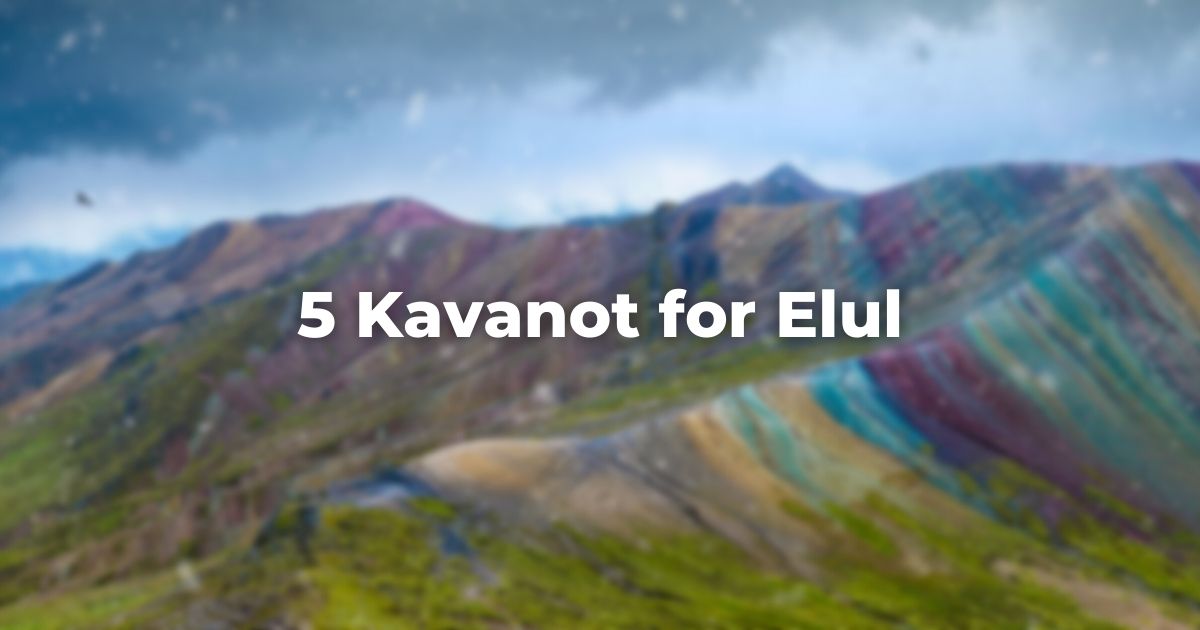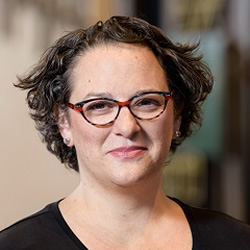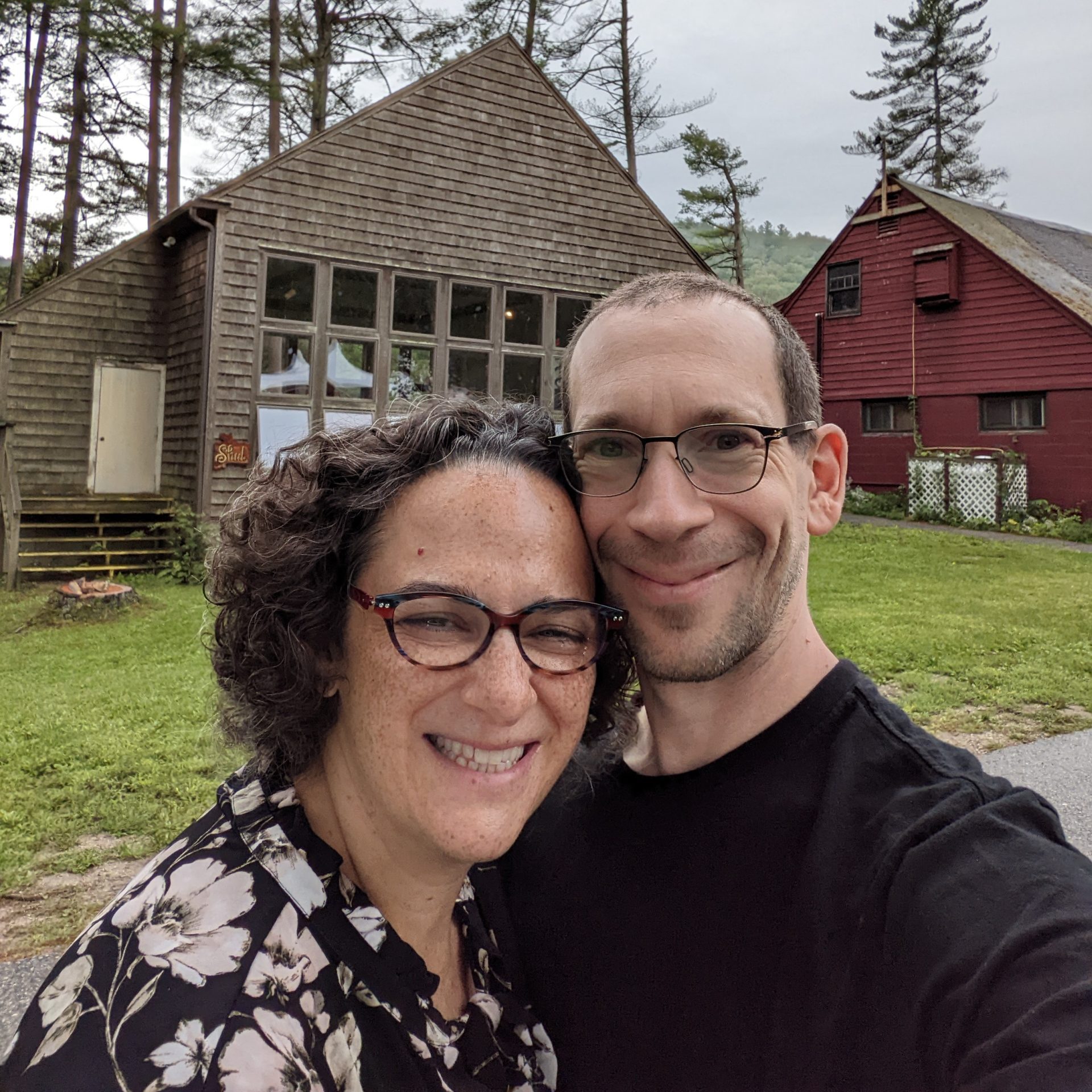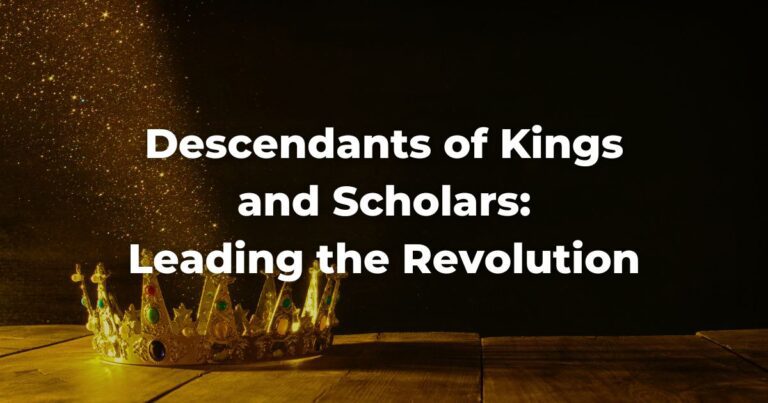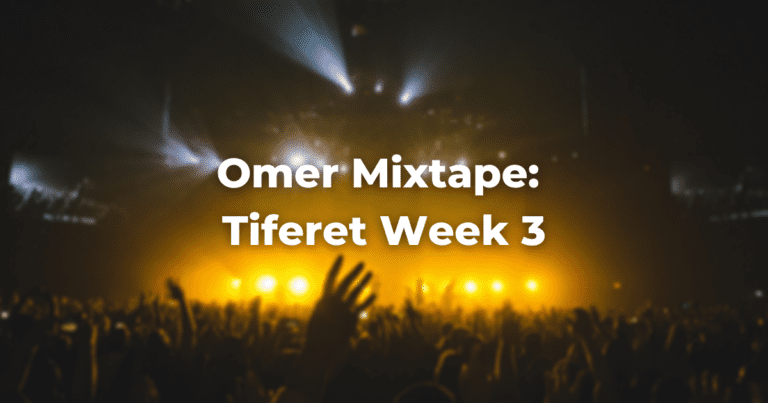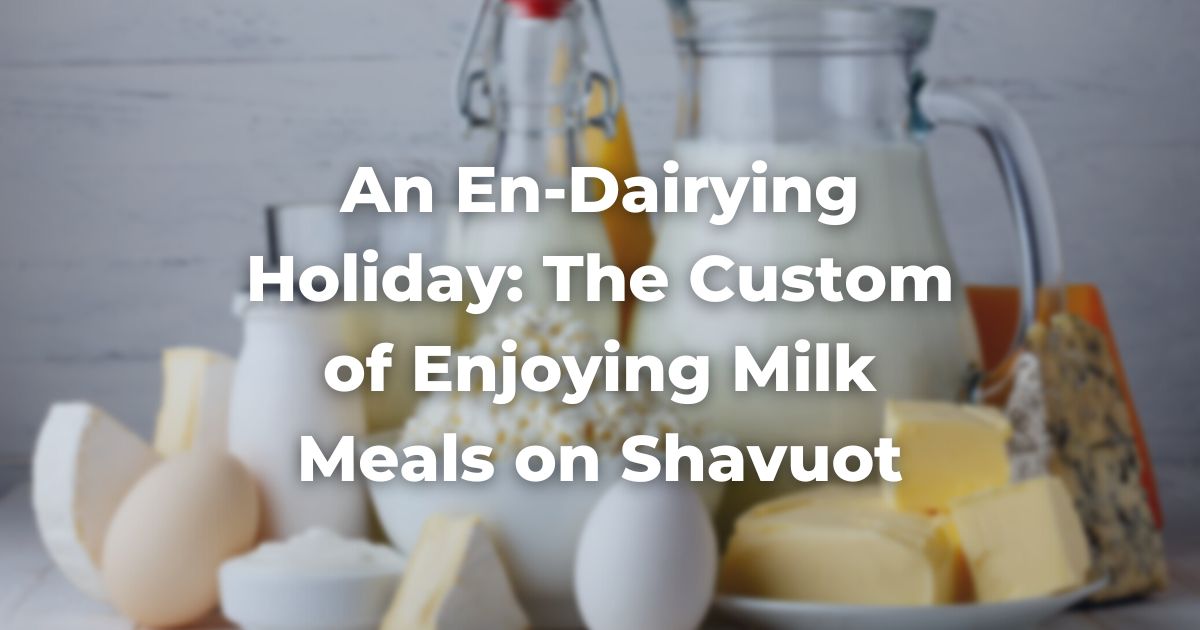Spouses offer their 5 intentions to prepare for the High Holidays.
As we learned together this summer, we thought about the values that are important to us in this time of preparation. We want to share with you our 5 kavanot, intentions, for preparing for Rosh Hashanah and Yom Kippur, the Yamim Nora’im, the Days of Awe.
We thought of this sort of like Sefirat HaOmer, the counting of the Omer that we do between Pesah and Shavuot. One intention—or kavanah—something to focus on, each week. Or, you could focus on one each day of each weekday and repeat the same pattern each week … whatever works for you!
Here are our 5 Kavanot to prepare for Rosh Hashanah and Yom Kippur:
1. Accept the Unexpected (Adam)
Last year, I read This is Real and You are Totally Unprepared by Rabbi Alan Lew, zikhrono livrakha, of blessed memory.
In it, he takes us through the grand process from Tisha B’Av through Simhat Torah. I happened to be sitting in the back of the sanctuary on Simhat TorahRefers to the first five books of the Hebrew Bible, the Tanakh, also called the Five Books of Moses, Pentateuch or the Hebrew equivalent, Humash. This is also called the Written Torah. The term may also refer to teachings that expound on Jewish tradition. Read more when we had just finished reading the end of Devarim and were about to start Beresheet and a strange question occurred to me: what if everything we’re about to read will be different? What if God creates the universe in a different way? What if Adam and Eve make different choices?
Of course we know the text will be the same. The difference is in us. The difference is in how we accept the unexpected in a text we think we know.
On Tisha B’Av the Temples in Jerusalem are destroyed, every calamity that can occur in Jewish history occurs on that date, and we mourn even today.
Later, we build sukkot in our homes and communities and we rejoice; all the while knowing the sukkot are meant to be temporary. Soon, we’ll take them down as well.
We come to these moments as if they are linear. We prepare for them in order. Yet, events in life don’t happen only once and they don’t happen in an orderly way.
As a civilization we had to reconcile what to do after the Temples were destroyed. So too in our own lives, we need to rebuild as it were, re-reconcile, after taking down our sukkot.
How do you begin again? How has my view changed? When we inevitably encounter the same problems or situations, what will we do differently? These questions are at the heart of teshuvah. They’re the questions that turn us. They’re the questions that return us home.
As we prepare for the High Holidays, returning to the same seats, the same prayers, the same situations as in years past, prepare for this New Year by expecting—and more importantly, accepting—the unexpected.
2. Love Yourself (Ilana)
The Hebrew month of Elul that begins this week is spelled alef, lamed, vav, lamed.
In the TalmudReferring to one of two collections, the Jerusalem and Babylonian Talmuds, edited in the 6th century, that contains hundreds of years of commentary, discussion, and exploration of the ideas in the Mishnah. One could describe it as Mishnah + Gemara = Talmud Read more, our rabbis associate this verse with the phrase from Shir HaShirim, Song of Songs, in which each word begins with those same letters (Shir HaShirim 6:3): Ani l’dodi v’dodi li, I am my beloved’s and my beloved is mine.
The rabbis used this concept as a metaphor: it’s not about two lovers in real life; instead, it’s about us and God—how we’ve become distant and we need to reconnect. I like this idea, but I also believe that we’ve become distant from ourselves, and that’s what we need to focus on first.
What would it look like for us to see ourselves as our beloved? To look in the mirror and offer words of affirmation, of love, of encouragement?
At times over the past few years, I’ve put sticky notes on my mirror to remind me of my personal health and wellness goals. Seeing those notes, and seeing my progress, has reminded me to love myself on this journey.
Think for a moment: what would your sticky note say?
In order to connect with God, we need to connect authentically and honestly with ourselves. To be our own beloved and to truly love ourselves. Self-love, self-care, health and wellness are at the very core of how we prepare for these Days of Awe. Consider how you might enhance your acts of self-care with this holy intention in mind.
3. Settle Your Soul (Adam)
We often value the kind of attention that’s sharp and focused. It’s the kind of attention that we might use to manage chaos and anxiety.
But that doesn’t necessarily mean we feel more settled. It doesn’t necessarily open us up to receive God’s gifts.
From time to time while meditating, I might be focused on a particular thing like the breath going in and out of my body. Thoughts come up and I let them go (sometimes more successfully than others). I try to give the full weight of my attention to what I’m doing and feeling.
I might notice a thought go by telling me (ironically) that I’m really attentive!
To the best of my ability, I try to focus, to find awareness, and to be vigilant to the experience. But then, often, here’s what happens toward the end of the meditation when I let that kind of vigilance go. All of a sudden, there’s a feeling like diving into deep, cool water. A feeling of expansion, ease, and effortlessness.
During the month of Elul and throughout the High Holidays we add Psalm 27 to our daily prayers.
It’s extraordinarily dramatic and in it, we hope that God will be present with us; to “not reject or forsake” us. Famously, we ask for something, ahat shaalti—just one thing, otah avakesh—just one request, shivti b’veit Adonai—“to dwell in the house of the Lord.”
That’s how we usually translate shivti b’veit Adonai. But recently Rabbi Gordon Tucker explained this last part in a new way. He said we might understand shivti b’veit Adonai as “to be settled in life … to be at home in God’s world.”
“To be settled in…” despite the circumstances and difficulties which surround us. “To be at home in God’s world…” fully present and at ease in a home which is expansive beyond imagination. Consider where you dwell and how you might become more settled—in a restful, open, and expansive way.
4. Know Where You Are (Ilana)
I spend a lot of time these days in my position at the Rabbinical Assembly thinking about what it means to be a Conservative Jew and how our movement can impact the world.
We are the center of the spectrum of the Jewish movements. That’s an interesting place to be.
We have laws and standards that shape who we are and what we do. We put great study and consideration into our decisions. When we come forward with a modern interpretation of Jewish law, we do so with great empathy for our pluralistic membership.
Whether the decision is about driving electric cars to synagogue on Shabbat or eating in a non-hekhshered vegetarian restaurant, we weigh the laws and traditions, we explore science and technology, and we balance today’s values.
It’s a complicated and delicate process.
Now, I realize, it all may seem irrelevant. All of this minutiae on issues that seem to be non-issues to most. Driving an electric car to synagogue on Shabbat? Eating in a vegetarian restaurant? For most of us, these might not be our primary concerns in life.
And yet, by embracing our Judaism that allows for these questions and struggles, that acknowledges the sensitivities of living our values, we hold a center that can be a force of stability into the future.
In these 5 weeks of preparation for the Yamim Nora’im, I’d like to suggest two action items in this kavanah of Know Where You Are.
First, pick up a book or an article about Conservative Judaism today. Read a recent teshuvah, responsa, on one of these issues. Learn one new thing about our Conservative movement and what we have done and will continue to do for Jewish life.
(See more: Conservative Judaism)
Second, the Talmud often asks the question mai nafka mina, loosely translated as, what am I supposed to do with this information?
So my answer is this: Conservative Judaism is about laws and standards, but as Rabbi Elliot Cosgrove wrote recently, it’s also about life and spirit. So, take these seemingly irrelevant concepts—driving the electric car and eating in a vegetarian restaurant—and instead of focusing on the details, ask yourself about the life and spirit, and the values, of Conservative Judaism.
What do these decisions teach us about the values of Shabbat and kashrut and how they interplay in our lives? Even if laws and standards do not fuel your Jewish passion, we can appreciate, and be passionate about, our Jewish life and spirit. So let’s go with that.
This year, explore your Jewish life and spirit so you can know where you are.
5. Go Beyond Yourself (Adam)
We wanted to end with a challenge from one of my favorite poets, David Whyte. We think his poem is a perfect invitation for this time of preparation. We hope it can help guide us all to accept the unexpected, love ourselves, settle our souls, and know where we are.
Just Beyond Yourself.
Just beyond
yourself.It’s where
you need
to be.Half a step
into
self-forgetting
and the rest
restored
by what
you’ll meet.There is a road
always beckoning.When you see
the two sides
of it
closing together
at that far horizon
and deep in
the foundations
of your own
heart
at exactly
the same
time,
that’s how
you know
it’s the road
you
have
to follow.That’s how
you know
it’s where
you
have
to go.That’s how
you know
you have
to go.That’s
how you know.Just beyond
yourself,
it’s
where you
need to be.
May this Elul bring us—and all of our families and our holy community—together in health and harmony. May we be able to accept the unexpected, to love ourselves, to settle our souls, to know where we are, and to go beyond ourselves.
We hope this is a time of deep reflection and growth.
Authors
-

Rabbi Ilana Garber graduated from the Double Degree program of List College (Talmud) and Barnard College (Religion) in 2000, and received her MA from the Wm. Davidson Graduate School of Jewish Education in 2003. She was ordained by the Jewish Theological Seminary in 2005, and immediately became an active volunteer in our RA (co-chair of Women’s Committee, served on Nominations Committee, Convention Committee, Zera’im: Seeds of our Future) while serving as Rabbi and Rabbinic Director of Lifelong Learning & Community Engagement at Beth El Temple (West Hartford, CT) from 2005-2020. A visionary Jewish educator, she created SULAM (Seek, Understand, Learn, Act, Marvel) in a complete overhaul of Beth El Temple’s religious school. Passionate about the mikveh, she wrote the curriculum to train mikveh guides for Boston’s Mayyim Hayyim: Living Waters Community Mikveh. Currently, she serves on the boards of Greater Hartford’s Mikveh Bess Israel and the Hartford Region’s Leukemia & Lymphoma Society.
View all posts -

Adam Berkowitz is currently Senior Web Developer at the University of Connecticut's Office of University Communications. While there, he has led efforts to improve web accessibility for the University's sites. Adam enjoys spending time with his wife (R. Ilana Garber) and his sons. His interests include trying to learn Hebrew (which is hard, but not as hard as French was), martial arts, and cooking.
View all posts

